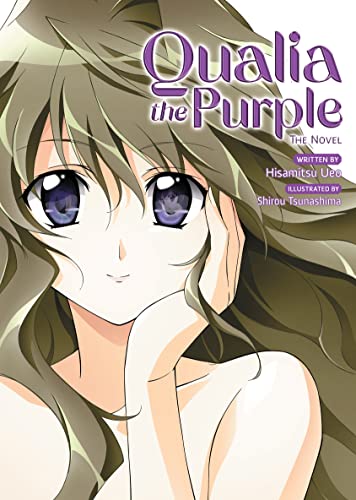By Hisamitsu Ueo and Shirou Tsunashima. Released in Japan as “Murasakiiro no Qualia” by Dengeki Bunko. Released in North America by Airship. Translated by Daniel Komen. Adapted by Carly Smith.
I actually had to double check the dates after finishing this volume, to see which came first: Qualia the Purple or Puella Magi Madoka Magica. The answer is Qualia came first, by about two years. Still, folks who are familiar with the main plot of PMMM are going to find certain similarities to the main plot of Qualia, even if the two are handled quite differently. Qualia the Purple doesn’t involve Magical Girls, but it is a hard SF series about trying to save someone over and over again and being unable to fix things no matter how many tries are made, as well as the dangers of grief and obsession. The first third is a short story that won an award, the last two thirds are the expansion for the light novel. The last two thirds are the reason to read the book, but I would not blame readers who stop after Page 30 or so. The start of this book is deadly boring, and while the plot twist explains why, it’s still boring.
The girl on the cover, and the center of the book, is Yukari, a young “genius” middle school girl who sees everything as robots. When she’s looking at someone else, she sees them as a robot. This has led to difficulties. The narrator, and the actual protagonist of the series, is Manabu, aka “Gaku-chan”, an athletic girl in Yukari’s class who is her best friend and is, at least initially, the “normal” girl in the story. That begins to change when Yukari is drawn into the search for a serial killer. It changes even more when there’s a new transfer student in the second chunk of the book, Alice, who is determined to befriend Yukari and have her join an organization for geniuses. And everything completely falls apart when Yukari is killed, and the REAL plot kicks in.
Intellectually, I think this book is excellent… once you get past Manabu explaining Yukari to the reader in cute ways over the dire first 30 pages. The climax to the “short story” part of the book was well handled and surprising, and the hard SF gobbledygook that infests the second part (and there is an awful lot of that, be aware) is at least vaguely understandable. Manabu’s growing desperation and the lengths she will go to in order to try to save Yukari are jaw-dropping, and I can appreciate the writing quality and the thought that went into the plot itself. Emotionally, I sort of hated this. Mostly as I really, really started to hate Manabu. She does not skimp on telling us the things she does and the people she manipulates in order to do what she is doing, and some of it (particularly Alice’s subplot) are frankly loathsome. It’s on purpose, of course, but that doesn’t mean I want to read it. There’s also the problem, which Yukari herself brings up, that everything is being done for her sake but she’s not allowed to make the choice herself. Yukari ends up being a goal rather than a character in the last half of the book.
Of course, I’m supposed to feel all this. That’s the point. I do recommend this book, which is like a puzzle in many ways, and the way that Manabu’s narration changes as she does, sometimes from line to line, is amazing. Just… it’s not a feel good book.
